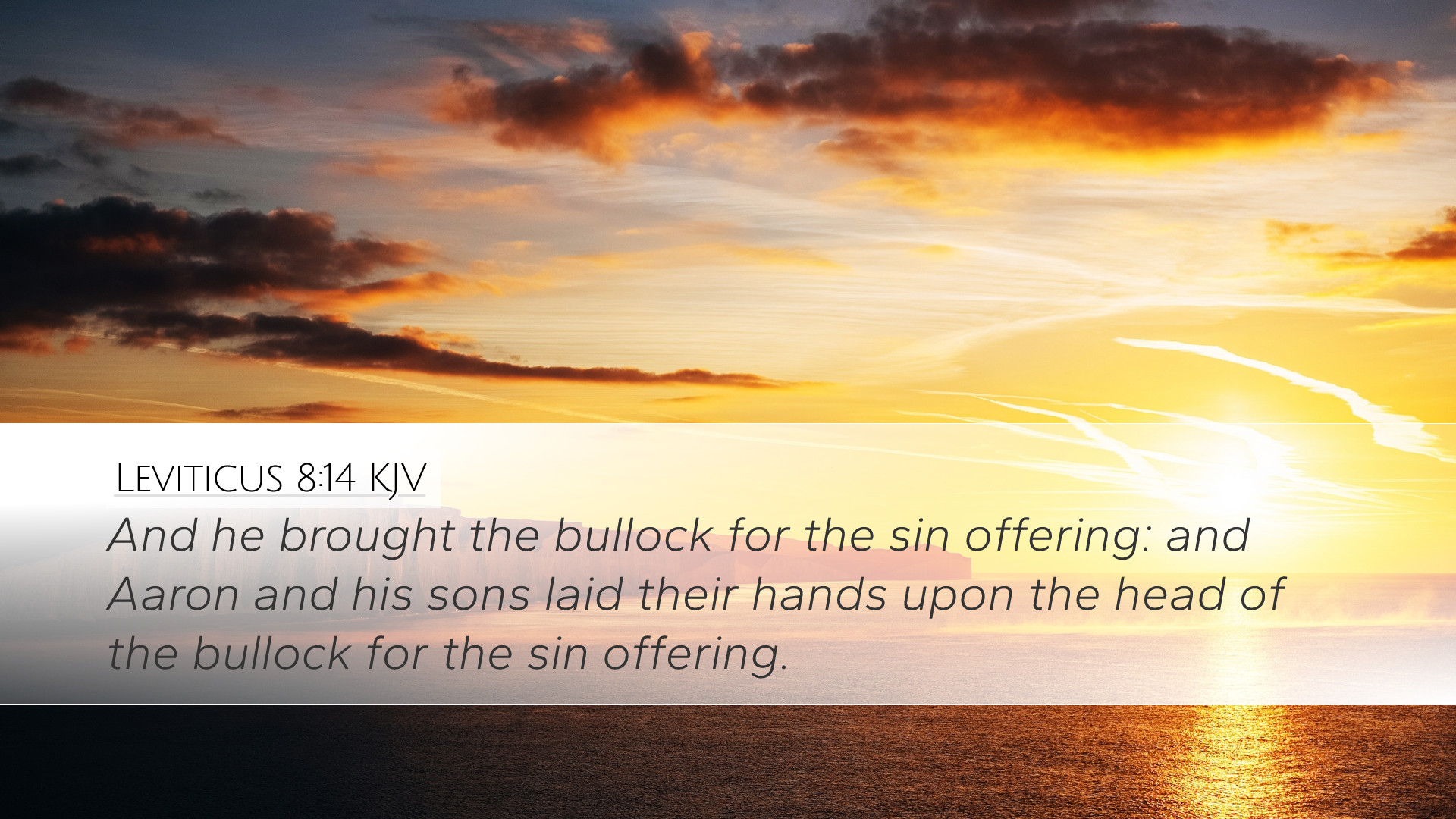Commentary on Leviticus 8:14
Verse Text: "And he brought the bullock for the sin offering: and Aaron and his sons laid their hands upon the head of the bullock for the sin offering."
Introduction
The verse in Leviticus 8:14 denotes a significant moment in the consecration of Aaron and his sons as priests. This act of laying hands on the animal signifies the transfer of guilt and the concept of substitutionary atonement, which is foundational in the Levitical sacrificial system.
Contextual Background
The book of Leviticus presents a detailed account of the laws governing worship and the responsibilities of priests. Prior to this passage, Moses had received instructions from God concerning the consecration of Aaron and his sons, who were chosen to lead worship among the Israelites. This act of consecration marks the establishment of the priesthood and its essential role in mediating between God and His people.
Commentary
In examining Leviticus 8:14, several key themes emerge that are significant for understanding both the Old Testament sacrificial system and its implications for New Testament theology.
1. Significance of the Sin Offering
Matthew Henry notes that the sin offering was indispensable in the ceremonial law as a means to atone for sin, which is a crucial element of reconciliation with God. The bullock served as a symbol of sin being taken away, reflecting the seriousness of sin and the necessity of atonement.
2. The Act of Laying on Hands
Albert Barnes emphasizes the act of laying hands on the head of the bullock, which signifies the transference of sin and guilt from Aaron and his sons onto the offering. This crucial act illustrates the theological concept of substitution, portraying that the bullock would bear the punishment that rightfully belonged to the priests.
3. Aaron's Role and Identity
Adam Clarke elaborates on Aaron's role as a high priest and his identification with the people. By laying hands on the bullock, Aaron not only acknowledges his own sinfulness but also reflects the shared responsibility of the priesthood in representing the people before God.
4. Connection to New Testament Themes
Leviticus 8:14 foreshadows the ultimate sacrifice of Christ. Just as the bullock was offered for the sins of the priest, Christ, as the ultimate High Priest (Hebrews 5:5-10), offered Himself as the Lamb of God (John 1:29), fulfilling and transcending the Old Testament sacrificial system.
Theological Implications
This passage calls attention to the nature of sin and atonement. It highlights the profound understanding that every bid for atonement involves a cost. As representatives of Israel, Aaron and his sons' actions point toward the necessity of an innocent substitute for the guilty, a motif further developed in Christian theology.
1. The Nature of Sin
The act of laying hands on the bullock confronts the issue of sin head-on, acknowledging that all have sinned and fall short of the glory of God (Romans 3:23). It serves as a reminder of the weight of sin and the need for an effective remedy through sacrificial atonement.
2. Atonement and Reconciliation
The ritual demonstrated God's willingness to provide a means by which His people can be reconciled to Him. This foreshadowing points clearly to Christ's ultimate ministry, wherein His sacrifice on the cross reconciles believers to God, as emphasized in 2 Corinthians 5:18-19.
Practical Applications
For pastors, students, and theologians, Leviticus 8:14 invites reflection on several practical aspects:
- Understanding Atonement: Engage with the depth of atonement’s significance and how it has been culminated in Christ's death.
- Leadership and Responsibility: Recognize the gravity of spiritual leadership and the accompanying responsibilities as seen through Aaron's actions.
- Repentance and Faith: Internalize the principles of repentance and needing a Savior, appreciating the lifeblood given for our transgressions.


